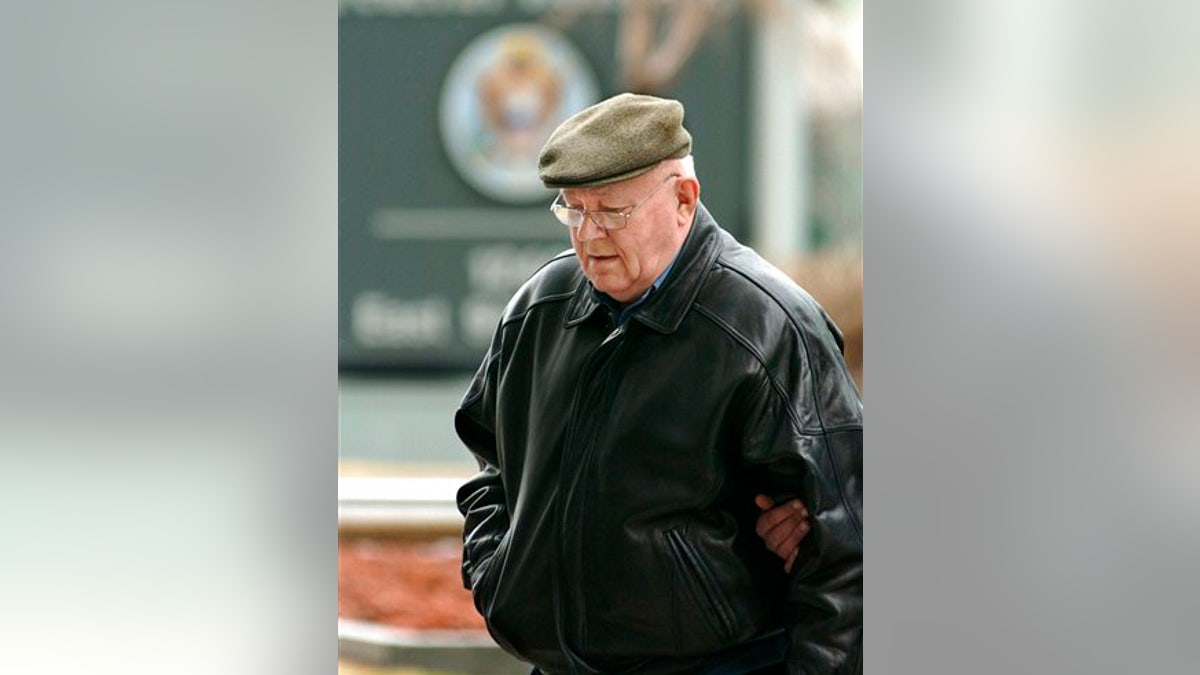
Feb. 28, 2005: Accused Nazi death camp guard John Demjanjuk arrives at the federal building in Cleveland. (AP)
Nearly 65 years after the liberation of the concentration camps, an alleged accomplice in the Holocaust is to stand trial this week in Germany — one of the last such cases and marking for some the end of Europe's darkest era.
German prosecutors begin their case against John Demjanjuk Monday morning in Munich, bringing charges against a man they say volunteered to guard the Sobibor death camp in 1943 and was complicit in the murder of tens of thousands of Jews.
After years of highly public trials for the architects of the slaughter, held in Nuremberg, Germany, Jerusalem and elsewhere, Monday's hearing at a regional court in Munich is set to be the last time the story of the Holocaust will be played out so fully in a courtroom — the last time survivors of the mass murder will testify against a man suspected of being one of their families' willing executioners.
"This is probably the last Nazi war criminal trial," said Rabbi Marvin Hier, founder of the Simon Wiesenthal Center, a human rights organization that for 30 years has hunted down Nazis in the U.S. and abroad.
Hier said that the Demjanjuk case is a rare one, offering the unusual confluence of hard documentary evidence proving the guilt of a living war criminal, custody of that suspected killer and the support of a willing government in Germany ready to bring the alleged concentration camp guard to trial.
Thirty-five relatives of Jews killed in the Holocaust are listed as plaintiffs in the case against the 89-year-old Demjanjuk. Two will testify on the stand about their families, which were wiped out in Sobibor, a concentration camp in Poland where 250,000 Jews were gassed.
"They'll be speaking for all the survivors alive," Hier told FoxNews.com. "In a sense it might be like the final testimony of the survivors — listening to voice of the victims of what happened there."
Demjanjuk, a former auto worker in the U.S., faces 15 years in prison, meaning he would spend about five hours behind bars for each of the 27,900 murders he is accused of helping commit by corralling inmates into the gas chambers of Sobibor.
But he is unlikely to live long following his trial, his lawyer says. Demjanjuk claimed a series of illnesses during his deportation proceedings this spring in the U.S., where he has lived for decades, raising a family and retiring quietly in Ohio.
"His physical condition alters by the day, even by the hour. He is an old man suffering from a range of ailments," Demjanjuk's lawyer, Guenther Maull, told Reuters.
"His mood swings, too. Sometimes you think he as an old man who is mentally absent but you don't know if it's a general condition or an illness," he said, adding Demjanjuk would attend the trial in a wheelchair and address the court in Ukrainian.
A U.S. representative from the Consulate General in Munich may attend the trial Monday, State Department spokesman Darby Holladay told FoxNews.com. Demjanjuk is no longer an American citizen, having his citizenship revoked for a second time in 2002 as charges and evidence mounted that he had been complicit in mass murder.
This is just the latest chapter in a 32-year legal saga that has spanned three continents. Demjanjuk was deported from the U.S. in the 1980s and charged in Israel with being the Treblinka death camp's notorious guard "Ivan the Terrible" — but that conviction was overturned by the country's Supreme Court, which said he was a victim of mistaken identity.
Now, at age 89, he is accused of serving as a low-ranking guard at the Sobibor death camp, charged with being an accessory to the murders of 27,900 people.
Demjanjuk maintains he was a victim of the Nazis — first wounded as a Soviet soldier fighting German forces, then captured and held as a prisoner of war under brutal conditions.
But German prosecutors say that after the Ukrainian-born Demjanjuk was in German captivity, he volunteered to serve with the fanatical German SS, received training with other Eastern Europeans at the Trawniki concentration camp in Poland and was then posted to Sobibor.
Demjanjuk is accused of having served as a Wachmann, a guard, the lowest rank of the Hilfswillige volunteers who were subordinate to German SS men.
There will be no direct living witnesses in Demjanjuk's case — the two men taking the stand will testify about their experiences and of the normal procedures in Sobibor — but prosecutors argue that all guards at the camp were involved in its machinery of death.
Kurt Schrimm, head of the special German prosecutors' office responsible for investigating Nazi-era crimes, said it was not until 2008 that there was enough evidence to pursue a case against Demjanjuk in Germany. Now, he said, there is an obligation to go to trial.
Hier, the founder of the Wiesenthal Center, said that he is seeking justice for Demjanjuk's victims after a lifetime of freedom for the alleged camp guard — no matter his age or condition.
"Here is a man who was ... present at the marriage of his children ... lived to a ripe old age, smiled when he wanted to, cried when he wanted to," Hier said. "None of these privileges were granted to his victims that he helped shove into the gas chamber. And we're supposed to have mercy on him?"
The Associated Press contributed to this report.
